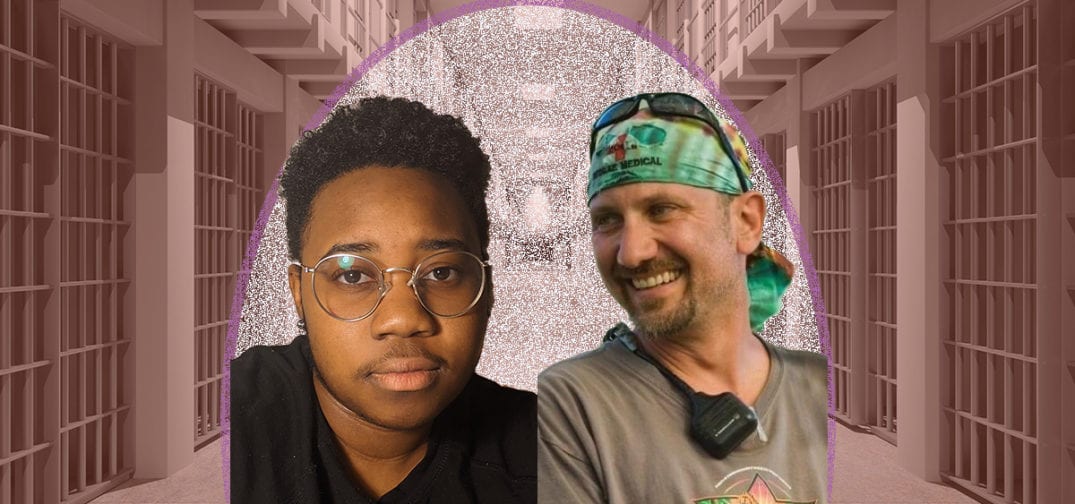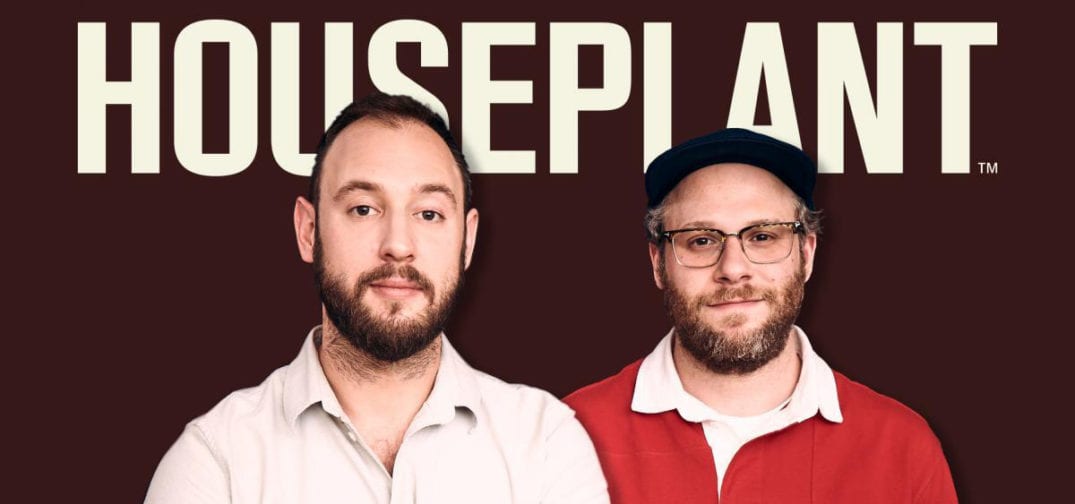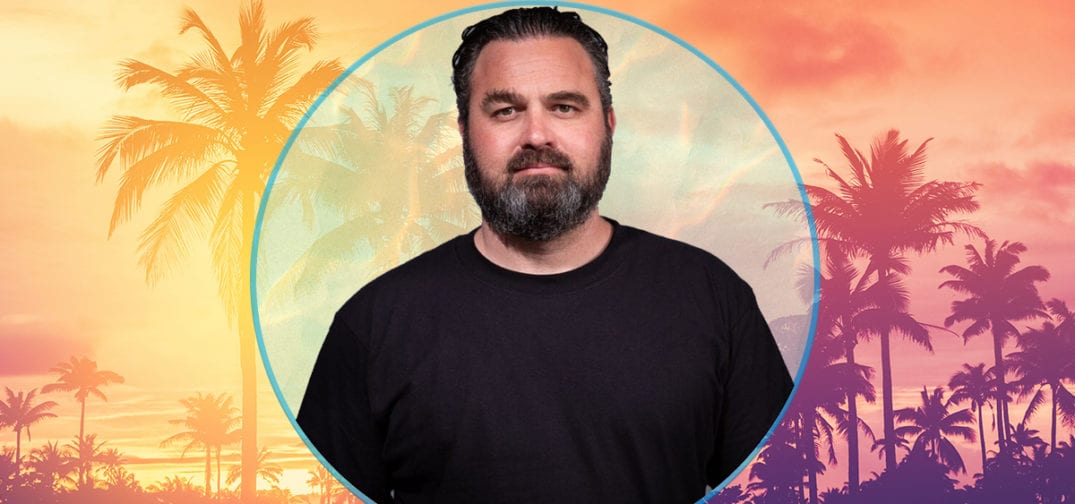For all the talk of community and cooperation in the cannabis industry, it is an inherently competitive marketplace, particularly in jurisdictions with a limited number of available licenses. As an entrepreneur, Elliot Lewis lives for — and loves — that competition.
In the latest episode of the Ganjapreneur.com Podcast, Elliot joins our host TG Branfalt to discuss the business philosophy that drives Catalyst Cannabis Co. and the exhilaration of pursuing and winning a new retail license in So-Cal’s limited, competitive marketplace. This interview also covers the company’s history, their industry “bad boy” reputation, how they manage to compete with MSOs and other brands with major investor backing despite having a significantly smaller war chest, and more.
You can listen to this week’s podcast episode through the media player below or through your favorite podcasts platform. You can also scroll down to find a full transcript of the interview.
Editor’s note: Some listeners may be offended by frequent swearing throughout this interview.
Listen to the podcast:
Read the transcript:
Commercial: This episode of the Ganjapreneur Podcast is made possible by Dama Financial. Get access to a secure, transparent banking solution with Dama Financial. Secure your cash, make and receive electronic payments, and stop worrying that your account will be shut down for being a cannabis business. Protect your money with an FDIC insured bank account and discover Dama’s suite of sustainable compliant financial products including merchant processing. Schedule a free consultation at damafinancial.com today or call 877-401-3262. Dama Financial is an agent of its financial institutions.
TG Branfalt: Hey, there. I’m your host TG Branfalt and thank you for listening to the Ganjapreneur.com podcast where we try to bring you actionable information and normalize cannabis through the stories of ganjapreneurs, activists and industry stakeholders. Today I am joined by Elliot Lewis. He’s the CEO of California-based Catalyst Cannabis Co., which recently rebranded from Connected SoCal, which has retail locations in Long Beach, Bellflower, and Santa Ana. How you doing this afternoon, Elliot?
Elliot Lewis: Doing very good. Thanks for having me on. Much appreciate it.
TG Branfalt: No, I’m excited, man. You have a really interesting story. I’ve read some interviews with you, read some things that you’ve written, but I want to get to know you a little bit first, man, get our listeners to know a little bit about you. What’s your background and how’d you end up in the space?
Elliot Lewis: Well, as we talked about right before we got on-air, I was a student at UC Berkeley that studied philosophy. I actually grew a little bit of cannabis in those days and had a three-liner in a basement. Pretty proud of myself. I was there when the Prop 215 passed. I was one of the first guys who was able to get one of those, whatever, the medical cards. There was only one doctor that would do it back then and Berkeley and Oakland were the hot spots to get it. Then from there I got pretty heavy into real estate. I was doing that from 2004 to ’14, and I had an old Cal buddy of mine, actually, that just kept growing, that was always hitting me up to do a grow.
And then I was a little reluctant at first because I had three kids at that time, four now. It was still a little gray. But I jumped in around maybe late ’14, early ’15. Did a few 215 grows. Those were fairly successful. Met some guys in Northern California. They needed a guy with real estate experience, so that’s how I started getting into it. And then when the ordinance came down here to my hometown, which is Long Beach, I read it and was like, “Ah, I wonder if I can figure out how to get one of these.” I had been part of some grow applications and stuff but never really got too deep into that part of it. And long story short, we ended up winning six here in Long Beach and then that clicked a switch in my brain that this is what I wanted to do, so then we’re moving block by block, street by street, city by city, trying to open up cities and acquire these retail licenses.
TG Branfalt: So I’ve had quite a few guests that have started in the real estate industry and made the transition. Can you tell me why you think that that is a trend that we see in this space?
Elliot Lewis: Well, I mean, every deal that you do, every store that you open either has a lease or it’s a purchase option that you end up purchasing, so the basis of the first step is real estate. Beyond that, I couldn’t really say what the correlation is. That was my in with the guys that had been around longer in the cannabis industry, so I just learned from them, hung out with them, and then took my own plunge and broke out and started doing things on my own and moved away from just being the real estate finder guy.
TG Branfalt: Interesting. So you’re in California. I mean, by all respects, it’s the largest market in the world for cannabis. It’s one of the world’s largest economies, if not the largest anyway. And recently, you did rebrand from Connected SoCal to Catalyst Cannabis Co. What was behind that decision to rebrand as most people in the space know how important the brand name is? And has that decision affected your customer base thus far?
Elliot Lewis: So the history of that rebrand, we were always just licensing the name, and sometimes people get this confused, but Northern California, their name’s Connected International. They were nice enough to allow us to license the name. Still have a very good relationship with them to this day. We were getting a little ways along in our retail acquisition. We play the game pretty rough. We’ve got code specialists, background checks and a merit-based process is very competitive, so Connected International’s main competency is selling flower, so it was a weird place to be in. The name of our parent company is Southcorp Holdings and we were licensing, basically, a name from them that was Connected.
So the owner of the Connected called me up, they call it the Real Connected, called me up and was like, “You know, ever body fucking hates your guys guts out there, right? They’re trying to sell cannabis in Long Beach and different places, in Bellflower, Santa Ana, even other cities.” People have come across us. A lot of times, we don’t win the licensing process. We’re very thorough. We do litigate and we price very aggressively. So he’s like, “Dude, you’re not helping us out here sell flower, in particular, in Long Beach.” I was like, “Well, it’s funny you’d say that. We’ve been talking about doing our own thing. And look, man, you’ve been a good partner.” We do own a small piece of Connected International, maybe 2% or so. We rolled in some grows with them.
So we had the conversation, and we were wanting to go out and get our own identity and they didn’t want to be mixed up with our bad boy of cannabis image, so it was pretty mutual. But they raised it and we had the conversation. He went to his staff. I went to my staff. We flipped it to Catalyst Cannabis Co., and the rest is history, and we’re really proud of what we’ve done here at Catalyst Cannabis. It’s nice to have our own identity. Their hashtag was designerweed. We’re weedtothepeople. We’re the underfunded, block to block street fighter, no lambo’s …. We price really aggressive. We don’t have any high-priced salaries or any of that fancy shit. We don’t suck money out of the company.
So it was cool to develop our own image, our own thing. We’re very tight with labor. We have an alliance with them, so we could now publicly make that alliance more official out in public. So there was a lot of little issues that were already bumping against each other, but it’s been a really good change. It really hasn’t affected much as far as sales or anything else. We are connected, no pun intended, to the Connected brand, and there’s been a shortage of indoor flower.
So I’m always calling them up like, “Hey, man, make the drop fatter,” and we leave the top-of-the-shelf exclusively for them and we have some other talks to continue to strengthen the relationship, but that’s the nexus of it. Their primary goal was to sell wholesale flower throughout California, and our primary goal is to go city by city and acquire retail licenses. And throughout that process, fellow retailers, we’re not that popular, and that wasn’t helping the Connected name. And for the record, I take hater-ism as the highest form of compliment, so it’s not something that I felt sad about. When I heard it, I actually appreciated it. The guys in our organization and our workers, we treat them like family, but we’re in a competitive license battle. We do everything within the framework of the rules to win.
TG Branfalt: You said that you have this streetfighter mentality, this street-by-street mentality, and in a lot of the stuff I’ve read about you, you’ve made a conscious decision to stay local. Why is that so important to you as other companies seek markets beyond their borders?
Elliot Lewis: So we did dabble a little bit in Missouri and Illinois, but the truth is, the California market is the best. There was this popular idea that if you were an MSO that was better. I think it turns out it’s not. You’ve now not consolidated your forces. So we’re really just bringing it back to Southern California. We might go up a little higher or a little lower. Look it, there’s 99 cities in the city of Los Angeles. Maybe 10, 11 of them have gone legal. There’s 34 in Orange County. Only one of them have gone legal. You’ve North County. You’ve got San Bernardino, Riverside County, etc., etc. There is so much to be done here. I mean, if we keep moving, who knows what the end number is, 40, 80, 100 licenses. I think we’ve got away from what the investors want and we’re just growing this organically and just trying to really make our strong presence here in Southern California.
Plus, at the end of the day, I think whoever wins California, that brand is going to be able to migrate. Ain’t nobody in California going to buy some sorry-ass Canadian weed or sorry-ass Colorado weed, but you better believe it’s going to work the other way where if you have a good name in California, you’re going to be able to migrate somewhere else. And without getting too deep into specific calls, there is people trying to figure out how to get into California, so we’ve already made a lot of our connections here. We understand how the system works, how to win a license, so it just makes sense to stay at home. And we’re not trying to get over our six skis and get in the Midwest and East Coast, and everybody knows, at the end of the day, if you make it in California, then your shit’s going to export anywhere. The day that some Canadian weed is a hot seller in LA, it’s a cold day in hell, never going to fucking happen. So I’m not so worried about speedily running across the country.
It will be interesting to see these bigger companies that are trying to get into California, how they’ll be taken, but for now, we just really try to consolidate our forces. That was our original core competency. We’ve got really good at the ops end now too, is just being able to acquire a license on a little bit of money. We’re not heavily funded. It’s all friends and family, ma-and-pas, that kind of thing. If we have to gamble 100 grand to win something for 10 million bucks, we don’t run around town, seven or 10 million bucks. So one of the reasons we have a chip on our shoulder is we probably have 5% or 10% of the funding as the big boys do, and with the five that we have, the 13 that we’ve won that we’re pushing, slowly but surely, through development, we think we’re going to have one of the bigger retail footprints in Southern California and we’ve got in this shit for pennies on the dollar.
TG Branfalt: I mean, what you’re doing is really, really exciting because, as covering this industry every single day as I do, and those same names that you keep mentioning or that you’ve mentioned or alluded to, pop up. I mean, maybe without divulging your secrets, but how are you competing with these massive MSOs, multi-million dollar companies? How are you doing this?
Elliot Lewis: Well, we have this radical idea that you’ve got to be profitable. It’s just a fucking crazy idea. Apparently, these mother fuckers didn’t get the memo before they started, right? They raised 300 million, 100 million, 120 million, spent it all on themselves. So we’ve been growing this thing organically. We are starting to have larger conversations about getting bigger amounts, and we don’t need a lot, right? We’re just trying to get the 13 that we have in the pipe built out. If we do that, we’re right there with them. The great part about this industry, if I go into a city, we just one in El Monte, we just one in Pomona, so Joe Blow, who’s got 100 million stack, he sits at the same table as me and I put 100K up and I’ll fuck that guy up in a retail licensing competition. And it’s not just because we play aggressive. We do all the right shit.
When we come into communities, we partner with local partners. We’re really big on our community outreach. Everybody that we’ve hired reflects what the values are of our company. We do play the game rough, but then we come in. We’re legit. We back up what we say and we’re good corporate citizens. So in so much as you think you could buy California, ain’t going to happen, right? I’m going to show up when city X is about to go. By the way, I’ve got seven or eight, I’m not going to say what they are on camera right now, that we’re hopefully going to get into in the next cycle. I show up with 100 grand. I can get a fucking license. You show up with 10 million, 12 million. Meanwhile, you’ve paid all your staff, you G&A, everything, and your ruling out your money, and my 100K plays just as good as your big bankroll. So we’ve had to, because we’re underfunded, learned to be efficient. We run the ops really efficient.
Everybody at our team’s bought into the mission, which is really important. We have super talented people. Besides the CFO, I’m the oldest guy here, I’m pretty sure. I’m like a grandpa at 42, but everybody really believes. We’re giving them equity in the company and then we’re keeping the payroll low. So the goal is that we build this great company and that if everybody buys into it, and that’s how we’ve really been fighting off the big boys. If you look at our total G&A for a year, our payroll’s about a million bucks. I’m on a thing, sorry. People walking in my office right now. Ours about a million bucks. All these other guys run a $20 million, $30 million payrolls, so they’re burning through money fast.
Meanwhile, we just making little bets. It’s a gamble. We don’t win them all. Sometimes we lose, but we’ve been very thorough in the litigation process. So if the process isn’t done appropriately, we do a public information request. We check all the data. We make sure there’s consistencies in the scoring and that sort of thing. And we’ve litigated against cities. It has been a fairly successful strategy as well. And, look, there’s a lot of corruption that goes on in this industry. It’s just a fact. We don’t engage in corruption.
And quite frankly, I think it lacks creativity and its just like a layman’s way of getting something done. And it’s really hard to prove how the duffle bag went over, but what I can prove was that your scoring in this area isn’t consistent with your published policies. And if I can do that on a mandamus action and litigation, I have a fairly good chance of being successful, so that’s another way that we’ve been successful at it. But with these guys that had a bunch of money in the start, they paid top market, hired a bunch of marketing pros, all this shit, they burned through their bankroll. We don’t really spend money on marketing either. We just offer the consumer the best price and the best menu. That’s our marketing, and little by little, word of mouth, it’s getting out.
TG Branfalt: So I want to talk to you more about your employees, but before that, I do want to ask you what is your relationship is like with your employees? Can the lowest guy on the totem pole, per se, does he have access to you because you seem very, very accessible and you describe yourself as a 43 year-old grandpa?
Elliot Lewis: To your point, every single guy, up and down, we’ve got about 150, I love them like they’re family. There’s no job I won’t do. We had a COVID outbreak at one of our shops. I went in there. We were running low on employees. Who was going to come in? Who wasn’t going to come in? I ran in there. I did the front desk for nine hours. I was a terrible receptionist. I was probably on my phone the whole fucking time. My wife came in. She came in with her friend. We were able to keep the store running, got everybody tested, and kept it going in a safe way. To the people that were out that had COVID, even asymptomatic guys, I personally delivered them the care package of cannabis. I have customers that hit me up all the time on IG. I do my best to try to make anybody and everybody happy.
I always love all the input. I find that I have a certain kind of way that I like to go, but the synthesis of ideas usually leads to the best outcome and I’ve got a lot of blind spots. Sometimes I move a little quick. I’m inpatient, so I’m really big on the group consensus. We’ve got about 11, 12 guys up here at HQ, and I tell this to the union reps or anybody, that I’ll give anybody that works for us, I consider them family, I’ll give them the shirt off my back. Same thing with our investors. We don’t have some big hedge funds that if they lose 10 million bucks, it’s one less fucking yacht. I’ve got these little ma-and-pa guys that are relying on me for rent and stuff. We call it OPM, other people’s money. It’s the most highly regarded asset that we have of this corporation.
I am very approachable. Anybody in the organization ever need anything. We just had a guy. He’s got a tumor issue, brain tumor. We kept him on full pay. He just was at the Cherry store over the weekend. Made sure he got free cannabis, whatever it is. So within our own family, it’s all love. We do whatever we can. When we’re out there in the street in a bare knuckle fist fight trying to win a license, we play for keeps. So it’s an interesting dichotomy that we roll over here, but I do like that we stay accessible. I love the input of the lowest man on the totem pole, so to speak.
We implemented a new thing where they can make any suggestion, it’s totally anonymous, up to HQ, so I want those comments. I want people to say, “Hey, knucklehead, you stupid mother fucker, check this out. Check this out. Don’t ignore this.” So that’s all stuff that is important to me because I think sometimes you get in a little echo chamber or you don’t want to be removed. They guys that actually know what’s going on are down at the store level at the frontline. So I never thought I’d have 150 employees. I’ve had to learn how to do HR and some of this other shit that’s a little laborious, and I won’t bore you with that and random issues that come up. But all I ever wanted to do was get one, and now we’re on this, whatever you want to call it, escapade of, “Fuck it. Let’s try to take as many as we can in Southern California.”
TG Branfalt: You’ve mentioned your employees a couple of times, and is it correct that all of your employees are unionized?
Elliot Lewis: Yeah, so they’re all unionized. That’s something we believe in. Anywhere that labor goes, we were all with them. And El Monte was a model ordinance. Our organization was a large part of writing it. There was a scoring matrix where that if you did have a collective bargaining agreement, you were given extra consideration. At this point, all we do is accrete additional stores so, in other words, we don’t have to negotiate a new deal every time. To my knowledge, we have the most generous collective bargaining agreement that’s out there today, and I always say that I’m fucking sure as day that we have the least proportional difference between what the lowest guy makes and the highest guy makes. For the record, I don’t make shit. I’ve never pulled $1.00 out of this company yet, but even our higher staff is only making a little bit more than the bud tenders.
So we’re playing the long game. It’s something we believe in. We’re really proud to have an alliance with UFCW. They also got their little regions that I’m learning about. You’ve got 324, 770, 1428, and I’ve just really learned a lot about it, but something we’re really proud of is healthcare, 401Ks. They get double time on holidays, paid vacations, so there’s really good benefits, and what we always try to do is promote from within. So as we expand, the bud tenders become lead bud tenders. Lead bud tenders became assistant managers. Assistant managers become managers, and managers, we pull up to HQ.
We do our Monday ops meeting just right before this, so we got guys in HQ, got a couple of them, a guy and a girl, started off as bud tenders and that will be the trend that we continue because it’s a lot easier knowing what you’ve got for a year, two years, three years, versus taking a wild guess on hiring. And honestly, those guys that are in the industry that are 25 to 35, they know their shit really, really well. I call them the cool kids. They know what’s going to sell at what price and it’s really important. When I was 18, it was you either had some swag weed from south of the border, and that was S.A.S. or you had the Chronic. It was all just lumped into one category. Now, they got 100 fucking different things that our cool kids stay on top of it, which is super important because ultimately, the consumers appreciate that. And we’ve found, having the right menu selection at the right price is one of the most important things that we could deliver.
TG Branfalt: So the other thing that I found interesting about the structure of your company is that you keep these C-suite positions low, which allows you to reinvest and keep your prices low. Tell me about the thought process behind that mentality.
Elliot Lewis: Well, it wasn’t like something set out that we planned to do. We’re a paycheck to paycheck operation where we make money off the five stores that we have, but when you have 13 build-outs that you need to knock out, you’re not knocking them out as fast as you want. So it started with me and then pretty soon they’re after my right-hand man. His name’s Davey and I call him the Keyser Soze of cannabis. He’s this mystical figure that everybody is afraid of, just genius guy. We love working together. Our deal that have with him, we don’t even have a written contract. “Whenever you get money, my man, just pay me.” So if he’s light, I’ll hook him up or we’ve had to sell a few of these off, unfortunately.
We try to sell as few as we can. We’ve sold a few of the bottom ones. We close a deal or a cultivation license or we get a little raise. I’ll come in his office and it’s like a joke. Pursuant to our deal, bang, I’ll drop him some money. So he could be making, easily, a million bucks. He’s one of the most valuable people in cannabis today, and he’s just, “Pay me whatever you got,” and again, it’s just believing in the thing. And everybody else who works here, then we hired two more people, so they got into that program and it’s just been what we’ve done, hired people at enough so they could pay their bills. Let’s not be greedy, fat pigs and take all our money now. Let’s wait. Let’s build this. Right now, we’ve got five stores and we’re pushing up the portfolio to 18. If we can get over the hump, 12, 13, 14, then maybe we could loosen it up a little bit, but right now we’re still just pushing the boulder up the hill and it’s been a big push and we don’t want to slow down.
Not that it’s a great analogy, but when Cortes showed up, not that he was a good guy, he’s an evil guy, I don’t want to get in trouble, but he burned the fucking ships, right, and 500 dudes. I’m not justifying the atrocities, but the analogy carries. 500 Spaniards took on a million Mayans. Why? Because there wasn’t no fucking way home. So that’s just the mentality that we’ve kind of taken and we keep pushing, pushing, pushing. Literally, before I got on with you, I’m working on how to finance our next build-out. I’m selling a property and then reselling it so someone else, taking out a little bit of the money and I just try to make it work little by little. So I spend a lot of my time doing that and leveraging this, making this move, raising 100 here, 200 there, where these other guys have just been getting stroked monster checks, but everybody who was throwing in with us is making fucking money. Everybody who threw in with, I won’t say their names, they lost their fucking ass, right?
So, I mean, you’ve got guys that came out in the dollars that are trading penny stock now. We did the reverse. We were penny stock and we’re working our way up. Hopefully, we’ll be able to build something great. I like the direction we’re going, but I don’t know why everybody’s bought into it. I think they see that we’re sincere in our mission in that I think they see the vision that we have and I think they believe in that and it means a lot. Anybody, up and down, if they ever had a fucking thing, I’d give them my shirt off my back. And everybody here, there is no nine to five shit. Everybody works until the work is done.
TG Branfalt: So you talk about rolling the boulder up the hill, and for the last eight months, every industry, every person, has been rolling the boulder up the hill with the pandemic. You mentioned that you had your own outbreak at one of your facilities. Can you tell me a bit more about operating under the conditions that you had for the last eight months and what challenges, aside from the outbreak, that you faced?
Elliot Lewis: Well, there was outbreak. There was riots. It’s actually been a good time for us. We’ve seen our sales go up. I call it the Bubba Gump Shrimp model. He’s the last guy that survived in the fleet. People were getting looted and we weren’t, and people couldn’t figure out how to work with COVID. They’re losing customers. We’re still going. Our big issue always, when there is a positive test, we disclose to the whole staff. There’s been different one-off and there was a three-off, but we disclose to the whole staff, and then whoever wants to come in, it’s voluntary. And usually, we pay them some amount extra, whether it be one and a half, two X, and we keep it going that way.
And just so everybody knows that I back up my shit and I do what I say, when we were really light at one place, I showed up there with myself and my wife, and my wife was bud-tending and her friend was bud-tending and I was working the front desk, no breaks, no food, on my phone. I got a day job, CEO, and I’m working the reception. I’m shocked I didn’t get any negative reviews on Weedmaps. I thought somebody was going to be like, “Who is this fat-faced mother fucker on the phone the whole time he was working front desk?” But we were able to pull it off and that rallied the troops. We got seven more the next day. A couple guys transferred in from other stores, so always just pushing that attitude like, “Yo, we’re going to stay open.” It’s important, employee safety, but the very first thing we do is always disclosure.
And then there was the civil unrest. So we had a little bit of an incident. They were able to make it through. They smashed up a window and whatnot, but I was personally out there, nothing lethal, nonlethal, bear spray and tasers and all that kind of stuff, just making sure that we protected our property. And, look, I understand why the people were upset. It’s a real issue, especially being in the cannabis industry and the fact that certain communities have been disproportionately impacted on the war on drugs. That said, we had to make sure that our places were saved. So a lot of guys got taken out during that time period.
There was also a supply shortage, and because we’ve been a good buyer, we’ve taken care of our vendors, we were able to battle through it. So amazingly, from January to today, everything we’ve done, we’ve over tripled the revenue. We’ve acquired more stores. We just kept going, heads down, and there’s been a couple things that we had to duck and dodge and there’s always an element of luck, but I do try to instill in the staff like, “Yeah, if there’s a moment and we can’t charge up the hill then we won’t, but until that moment comes, heads down, let’s go. We’re on a mission.” So that’s our mantra here.
TG Branfalt: You mentioned the supply chain. Was that due to the fires or were you guys impacted by the fires in any regard?
Elliot Lewis: I think it’s just one of these weird 10 year storms. A, it’s seasonal, right, so it always happens at this June, July time. And then some guys got took out by the riots. I know 710 and some other ones got taken out, and then there was the fires as well. I suspect that some of the legal industry, because there was such a shortage, was diverting product. I don’t know, but there was some of those rumors going around. So it was just this really weird thing where the prices shot up everything. There was COVID. There’s this weird relationship between the illicit market and the legal market that nobody really likes to talk about. So as a legal operator, you want to see the elicit market go away, right? But oddly enough, when it goes away, the legal market somehow finds ways to make sure that it hits a little bit of an equilibrium.
So I think because of COVID, and this is all just guessing, but it really affected the illegal market, so it would incentivize bad actors to also bring product into the illegal market as well. So probably 70% of the market is still non-legal and there’s a lot of demand there as well. So you had COVID. You had the riots, which was a big thing. And then just the time of year it was seasonally. Then I think guys that were legal growers, maybe some shit was accidentally falling off their truck or whatever, I don’t know, but we found it really hard to stay stocked. Actually, it just came up in our meeting that there’s more coming online.
I presume that within 18 months to 24 months, if you look at all the lights that are coming online, there should be an oversupply of cannabis like that’s happened in most of the states, is the retail licenses are limited, whereas the grow licenses are pretty easy to get your hands on. So it’s been a battle but I think, in the end, for me, those things actually help us if we’re able to outperform or work ourselves through it, and it also slowed down the game. If all the cities go at once, we’re played out, right? But the fact that they’re moving slowly and COVID slowed them down and we can play in three or four places at a time, that plays right into our strong suit. We’re sitting at a table with a small stack, so we’ve got to slow the game down as much as we can.
TG Branfalt: That’s really, really, really interesting insight. And I want to talk to you about some other insight that you actually wrote in September in an op-ed in the Grunion. You supported this proposal by the Long Beach city council to increase taxes on local retail cannabis sales by .5% due to city budget shortfalls caused by the coronavirus pandemic. You estimated it would cost you about $125,000.00 to $225,000.00 if they were to enact this, which to most business owners, they look at a proposal like that and they’re like, “No fucking way.” So why did you come out in such strong support for that proposal?
Elliot Lewis: So I got the shit kicked out of me by the industry on this one, but I’m from Long Beach, so born and raised here, lived here my whole life, traveled a little bit, went to school. But other than that, lived here my whole life. And the idea was it was going to be a temporary raise, right, that when the city got back on footing then we could talk about lowering for the long haul. I’d like to see the overall rate come down. But, I mean, if you had a barbershop or you had a restaurant or if you had a gym or you had a nail salon, you would have got down on your knees and thanked God if your taxes were just going to be raised half of a percent or 1%. And I think a lot times, we have to take a hard look and just be honest and now fall into orthodoxy.
Simultaneously, in Bellflower, we were arguing to get down the manufacturing and distribution taxes, which ultimately happened because they were too high and didn’t work. I think, for me, because it was my own hometown, and now the businesses are coming back up and stuff, but I would drive down to Second Street. You never could find a place to park. There was parking for days in the height of the pandemic and everything was closed down and our budget is short. If it’s six months or a year of paying more taxes, now, of course, the risk is they don’t re-lower it and they get addicted to the money.
TG Branfalt: Of course.
Elliot Lewis: But it was meant to be a temporary tax raise. But if you’re in the cannabis industry, you’re one of the lucky ones. We’re the luckiest people on the face of the earth right now as far as businesses are concerned. Sales are up. We’re still able to operate at full speed. They say it was because it was medicine. I suppose it’s because the municipalities and states really like our money. We bring in big sacks of money every quarter. I’m sure that helps, but it was something that was sincere, and I only wanted it to be temporary, but it did get a lot of backlash from the industry. I’m in a trade organization out here. It officially got me kicked out of that, but …
TG Branfalt: Oh, no kidding?
Elliot Lewis: Oh, yeah. But I don’t give a fuck. I just say what I want to say and the chips fall where they fall and if people don’t like it, they don’t like it. And honestly, if you would have gamed it out politically, it’s a sincere point and I wanted to make it at the time, and I think it was a point to be made. But then when you go to have the broader conversation two years from now when the economy’s healthy and Long Beach is getting all its money and the oil companies are back up, with all the different places Long Beach gets money, you could be the guy standing there that says, “Yo, when it was COVID-19, I was here. I was stepping up, and I was willing to pay an extra half of a percent, 1%.” Now I’m saying, “Look, the city’s got enough money. These businesses, they need to compete with the illicit market. Let’s take it down a point or two,” right?
And so I think that you have more credibility when you approach an issue without an absolute ideology, and at one moment in time, “Hey, this would be the one exception to the rule. Everybody’s suffering and let’s raise them.” But then, as the city gets more healthy, I think it also gives you an opportunity to say, “Hey, remember us. We were the people that were there saying, “Come on, let’s go. Let’s raise the taxes.” And as part of that deal, we ended up getting the hour of operation anyway. They were willing to add an extra hour of operation. So we were going to net profit because if it was a half a point and an hour of operation, we were going to net profit from the deal anyway.
And like I said, the comparison is clear, right? Any other business, let’s put cannabis aside, and don’t get me wrong, cannabis taxes are way too fucking high, way too much red tape, but at the moment, in the pandemic, any other business, borrowers, I know a bunch of them that are local, they’re like, “Man, you’re fucking lucky as shit. We’re getting the shit kicked out of us.” So I just think it was the right thing to do. I stand by it now and I stand by it in the Grunion.
And the Grunion thing was funny because someone tried to leak it as a shit talk, and I have an idea of who it might be, on Instagram. But what they didn’t know was, “You’re not leaking this shit. I’m trying to get an op-ed published right now in the Grunion Gazette” Everything I say, I can say out in the open. I’m a pretty direct speaker. It might be one of my weak points. It could be a strong point. I don’t fucking know, but that’s something that I stand by and I think has been misconstrued a little bit.
And there was some real weird commentary behind it. It was meant to be temporary, show good faith, and then we’d come back to the table. Here in Long Beach, we’re eight with rec. It’d be nice to get to six or seven, but they did extend business hours an hour, so I think that kicks in here pretty soon, maybe around Thanksgiving time or so, I think, maybe 30 days from either tomorrow or last Tuesday, whenever it was. So that’s it. It was an unpopular decision, but I took it and stand by it and got no regrets.
TG Branfalt: So I’ve got to ask you, just sitting here talking to you, you’re very passionate and you’re very interesting, which a lot of times, you get people who run dispensaries on the show and they’re very buttoned-up, so truly refreshing. So I’ve got to know what, for you, is the most rewarding aspect of this industry?
Elliot Lewis: Well, I mean, look, the thing we’re most proud of is being aligned with the union and the jobs we’re creating and the community outreach, and that really is what we want to do, be a good corporate citizen. But we take it a step back, but I give you the knee-jerked response, I just love the fucking hustle, man. The money, to me, is just some abstract score-keeping. If I had a whole bunch of more money, I wouldn’t move. I wouldn’t buy a different car. None of that shit would change. I wouldn’t wear a watch. I just really enjoy the game. I think license hunting is exciting. My passion is trying to build the biggest company we can for the right reasons. And like I said, we’re an interesting dichotomy because we’re fucking killers, and my guy who’s sitting next door, Damian, he’s just a stone-cold killer too, right, when we’re trying to win these licenses.
But we believe, deep in our hearts, and no fake-ass shit, and no, we’re not saying it to go win some more shit somewhere else. We really believe in being a good corporate citizen, creating good jobs, creating healthcare. And in every place we go, we’re going to do community outreach, and we’ll see how far we can take it, but I don’t think there’ll every be a time, no matter how big we get, and it gets harder and harder as things grow, where we’re going to be the kind of company that wants to pig out at the top and not take care of our workers. So we’re super passionate about that, but I just love the game. And there’s nothing better than sitting at a city council meeting and they’re going to announce the winners, and you think maybe who are your votes, and you don’t know who the other guys votes are, and the other guy thinks he has a certain vote and he knows he ain’t got it. You’re laughing at his ass. I mean, I don’t want to get on too much of the game, but that shit’s great.
And you’re talking about the big boys, right, and I call them the trust fund babies, not the individuals, but the companies, right? They grew up with 300 million, whatever, in the bank, so they’re not really able to run a business because they had too much money to start with, right? We’re the gritty, started with very small money and built our way to it. So being able to out maneuver those guys and outplay them, and maybe I don’t even like winning as much as I hate losing. I think somebody either Tiger Woods or Jordan said some shit like that, but there is something to the allure of winning. And with those wins, though, I truly believe that in any city we go into, we’re the best applicant.
I fucking answer every call that same day. I’m a liaison for almost all of our eddies. When we have a local partner like we do in Pomona, he’d take the call, but it’s important to me. No matter who it is, I clear my deck at the end of the night almost without exception. The buck stops with me. We fuck some shit up, I come in there and say, “Yeah, I fucked it up,” right? And vice versa, if you have an issue, call me anytime. I hope I’m always able to do that because it keeps you in touch with whoever it is, whether it be political people who want certain things or want the store to look a way or want you to run it a certain way, or the bud tender who has certain opinions that are very valuable as well, or whatever input from staff. It’s all just super critical. But the chase is really what gets me.
I’ve had investors ask, “Well, what do you think the end game is?” I go, “Well, I’m 42 now. One thing I’ve learned is I think a lot fucking different now that when I was 30 and a lot different than when I was 20, so I have no idea how I’m going to think when I’m 50,” but sitting on a beach drinking something fruity sounds like fucking torture to me. Maybe when I’m 52 or 62 or at some point I’ll have enough, but right now I couldn’t think of anything you could be doing on the face of the earth that’s more fun. It’s a brand new industry. It’s super dynamic. It’s always fucking changing. It’s street by street, block by block, like I said, and this is the most fun I’d ever want to have.
So when they’re like, “What’s the endgame?” and the endgame sounds like some place with a white sand beach and a fruity drink, it doesn’t really sound that great to me. Maybe I get there when I’m older and I slow down a little bit but, to me, the real excitement is the game itself. It’s really fun. And we do it for the right reasons, and I think that actually helps us get to being good corporate citizens, right, because I would be embarrassed. And I everybody has their own way of rolling. I know guys that roll fat. That’s all good for them. But I’d be embarrassed if I was rolling too fancy. So I don’t think that no matter where we go or how it happens, that’s going to change anytime soon.
TG Branfalt: So you know that they say that people who swear very often are trustworthy and truthful human beings, and so I — so I can’t wait to ask you this question, man. What advice do you have for entrepreneurs? I can see you. People won’t see you, but you’re Cal pullover is faded and you’re an every man, basically. And you get that in this industry, but I don’t think to the extent that you represent yourself as and probably are. Anyway, gritty, foul-mouthed, what’d you refer to as, as a fat-faced fuck, what advice does a guy with your background, with your attitude, have for entrepreneurs?
Elliot Lewis: Well, it’s an interesting conversation. As I get to know you better, I’ll be a little looser with it. If I’m having a conversation, the first time a meet a political person, I’ll tone it down a little bit. I’ll probably still drop one or two in there, right? It won’t be probably quite as much. On this interview, I’m just loose. We’re just chatting. It is an interesting question. I’m probably mildly more careful if I don’t know somebody or whatever, but I don’t really think about it that much. But as I get to know someone, it’s just way of talking. I don’t know if it’s good or bad or what. It’s just how I talk. Long Beach is like that. It’s how I grew up. It’s how everybody talked.
And you know what? People sometimes will ask me for advice, young guys, not a lot of times, but it happens, and I’ll be like, “Just do you. If you’re a nice dresser and you’re refined and that’s the true you then just do you,” so that’s me. But, look, if I’m giving a presentation in a council meeting, I’ll try to lay off the F-bombs or I’m meeting maybe the next generation above me council person, I’ll lay off it. And I’ll probably still drop a few in there. I might do one of these they can’t see. Sometimes when I meet someone for the first time… Hey, I’m on a podcast, bro.
Speaker 4: Oh.
Elliot Lewis: Yeah. I’ll turn the hat around and try to get it a little bit better, but I won’t change much else.
TG Branfalt: It’s a nice hat.
Elliot Lewis: The most I’ll do, if I’ve got a guy who might put in a little bit of money, I might flip my hat around. I might not. But for the most part, there’s not a lot of changes in the appearance or the vernacular.
TG Branfalt: So what would you tell someone who comes up to you and says, “What advice can you give me as somebody who has successfully created a business without six figures, seven figures, eight figures”?
Elliot Lewis: Oh, well, I mean, to me, the main thing is action. I failed a lot in life too. I went busted in the foreclosure crisis. I was doing pretty decent in my 20s. Went busted in 2007 time period. Had to rebuild it. Then we started doing foreclosures. I spent a couple years of my life as a meth addict, so I had to overcome addiction. Yeah, I’ve smoked enough meth in my life to kill a fucking elephant, so I had to deal with that. I’m 15 years past that. The fact that I’m a CEO of a company today is crazy. Right after Long Beach, we tried to run an ordinance in Compton. We didn’t know what the fuck we were doing. We got the shit kicked out of us there. So a lot of it’s action and just learning from your mistakes.
You’ve got to have a good strategy and an approach and get more wins than losses, but I find it’s a weakness and a strength. If you compare it to a poker player, maybe I play a few too many hands but then you figure-
TG Branfalt: I wouldn’t want to play you.
Elliot Lewis: … Yeah, we figure out things from that and then as we get to the next generation, we get better and better. I’m just generally a risk-taker, so there’s really no easy way to get there. My advice would be to be patient. We’ve got a couple of interns. They went to finish their senior year. They’re coming back. I really like them and I can think of myself at 20. It’s like, “Oh, I’ve got to make it now,” but I think, at the end of the day, you’ve got to put in the hard work. It’s a lot of work. It’s a lot of pressure. I take it all pretty well, but the biggest pressure point is that I have people give me their money, and they trust that I’m going to give them a good outcome.
So I give them all the same spiel. I go, “Look, there’s no guarantees. Everything has risk. I think this is a great opportunity, but I just want to make sure that you know that it has risk.” But the guarantee I give them all is, “I’ll treat your money like the most important thing in the world and I’ll fucking work as hard as I can to make sure that the investment is successful.” And so a lot of it was from learning. I had to get a little more mature. I mean, I’m barely mature now. I was horrible in my 20s, right, and I blew up. I partied too much. I let my ego get the best of me and I had a long way to claw back.
And I don’t know why I’m going to say this on your podcast, but literally lost my mind. They had me tied down to a bed in a mental hospital for a few days. Now that’s way behind me. I’m not ashamed of it. It’s who I am, right? I got heavily involved, during that time, in a 12-step program because a lot of the way that I live my life today, when you focus on self, and look, we all do it, I don’t want to put that out in the universe that I think I’m some great chivalrous person or whatever, but I try to do my best every day. What can I do for somebody else? How can I help this guy? How can I help that guy? How can I be a good husband? I have four kids. How could I be a good father? And when that’s at the forefront of your mind, I think you get a lot more joy out of life.
So the good thing from some of those crashes that I had, I had to relearn a philosophy of getting out of yourself and trying to help other people. And, look, everybody gets absorbed here and there and has their streaks of narcissism and greed. God knows I have my own, but I’m always trying to reset and remember, “Hey, look, this is why we’re doing that.” And anytime you’re going in that direction, I feel like you’re winning like, “Hey, what can we do for this guy? What can we do for that guy?” And sometimes, like I said, it’s the little thing that really makes me feel good, whether it be being able to deliver a cannabis care package myself and text the guys when they’re sick. Yeah, I could have a guy drop it off, but that kind of stuff, it means a lot to me and I always want to stay engaged and do that. And the second I walk in my front door, believe me, I’m humbled. I’m sixth on the list. Yeah, there’s six of us. I’m sixth on the list. So my joke is, I’m CEO hat and then I walk in and then I’m bottom of the barrel employee, so that keeps me humble and grounded too.
And I try to do my best at all that stuff. Again, I’m not perfect, but that keeps it focused, but I had a lot of failure too along the way, made a lot of mistakes. And I think this time in my life, I’m ready for. I’m mature enough to handle it. I had a few ideas in my 20s, but I was a dip shit, so all those have been important. My advice to anybody would be, “Fuck it and go for it. You’ve got no wives. You’ve got no fucking kids. You’re in your 20s. You have nothing to lose. Go bust. Who cares? Start back over. Go sleep on Mom’s couch. Just do it,” right?
It’s the action and then learning from that, but there’s no way you could read it in a book. There’s no way it could be taught. Cannabis can’t be relearned. You see these super smart CEOs and guys who run high-end retails coming in. My fucking purchaser will kick the shit out of any of those people because she knows what the market is. She knows the industry and it’s just something that you have to learn. Same thing with cannabis and how the process learns, just by being at each process. It’s not one-size-fits-all, but there’s different little bits of knowledge that come from each one.
TG Branfalt: So, man, I really, really appreciate you telling your story. Not a lot of people would be as open, especially with some of the personal stuff, and I think that that adds to your credibility in a way that I appreciate, at the very least. So where can people find out more about Catalyst Cannabis Co., and maybe more about you?
Elliot Lewis: Well, they can probably Google. I don’t know. No, we’re actually just redoing our website right now, so we’re going to have catalystcannabis, I think there’s a slash in it, .com. Just Google it. It’s almost finished. It was a bit item at the meeting. I think there’s a rough version that’s up. There’s probably, like anything else, some publicly disseminated information. I’ve done a couple interviews, not a lot of stuff. If there is something that I want to get out there it’s that we really love the customers too. Just like we love our workers, we love the customers. And I’m always debating different forces with inside our organization that we could price a little bit higher, we could stock a little bit more. And it’s a good debate to have and, look, if we don’t monetize stuff, we can’t exist, right, so we’re always walking that line.
But the message I’d like to put out there is we’re fucking running on some razor-thin margins, and we’re able to do that because everybody wants to say, “Oh, it’s high taxes. It’s fucking regulation.” Yeah, that’s part of it, but the reason we offer the price so good is because we’re sacrificing up here at C-suite. So there’s not a lot of stuff out about us. We were licensed as Connected Cannabis for a great deal of time and had different names on different stores. I always say we’re their newly spawned bastard cousin and we’re trying to make our own identity. We’ve really only been us, Catalyst Cannabis Co. The parent company has kept the same name, which nobody knows, for whatever it’s been, three or four months. So we’re trying to build that brand. We’re trying to put out that identity. Weedforthepeople sums it up if you could sum it up in a hashtag, but I’m sure, as you could gather from this interview, we just try to be the gritty, blue collar, not flashy guy.
We’re not big into throwing $100.00 bills on girl’s asses to sell weed. That shit, to me, is whack as fuck. And I’m not going to name names, but there’s a bunch of people out there throwing $100.00 bills on girl’s asses and rolling around with Lamborghini’s and shit. I don’t know how that sells weed. I’d rather just sell it to you for cheaper and not have some guy throwing $100.00 bills on some girl’s asses. And I know everybody who puts that shit in that package, so it’s no better than the stuff that I could white label, right, and I can give it to you at a cheaper price. So we keep the menu really high-end and good, but we deliver it underneath everybody else. And hopefully, eventually, the consumer realizes that. It’s all played out. The hot girl model shit, none of that shit’s my jam.
I want the everyday working man, the everyday mom. I want Grandma too. I want Grandpa. And I’ll take the cool kids as well, but we’re going for the, I don’t want to say radically uncool, but I’m down with that, right? And hopefully, that catches on and becomes cool in its own way, but nobody from this company’s ever going to do this shit. I’m on a video, sorry, but you would be throwing 100s at a girl’s ass. I just don’t think that’s fucking cool. I don’t think that sells weed. I don’t think that has a fuck at all to do with anything, but it’s out there. So I’m hoping that maybe we could change that culture too.
TG Branfalt: And that’s Elliot Lewis. Man, he’s the CEO of California-based, Catalyst Cannabis Co. Dude, thank you so much for taking the time to be on the show, man. And I’m going to get you on this show again because-
Elliot Lewis: Let’s do it.
TG Branfalt: … this is thoroughly entertaining and thoroughly informative, and I really didn’t anticipate this and I’m fucking …
Elliot Lewis: Well, by the way, rule number one, because we’ve got a few rules, rule number one at Catalyst is gun it. So I think once you put that rule into play, the rest of the shit falls into place. You play loose. It’s fun. It’s easy. Don’t take the shit too seriously. But we work hard, but we want to have fun. So I appreciate you having me on. It’s been fun. I love talking shit for whatever it was. Damn, I was supposed to give 45 minutes. I could hear myself talk all day. No, I’m just kidding. But I appreciate it and I’d love to catch up soon.
TG Branfalt: Hopefully we will, man, really. You can find more episodes of the Ganjapreneur.com podcast in the podcast section of ganjrapreneur.com on Spotify and in the Apple iTunes store. On the ganjapreneur.com website, you’ll find the latest cannabis news and cannabis jobs updated daily along with transcripts of this podcast. You can also download the ganjapreneur.com app in iTunes and Google Play. This episode was engineered by Trim Media House. I’ve been your host, TG Branfalt.























